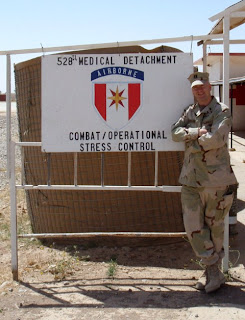
The tragic shooting rampage at Ft. Hood last week has special significance to me as I too am a military psychiatrist. I deployed to Iraq for seven months in 2008 as a combat stress control psychiatrist (see picture)just as Major Hasan was scheduled to do. Major Hasan completed the military medical school (Uniformed School of Health Sciences) in Bethesda (4 years), then completed a residency at Bethesda/Walter Reed (4 years) and a fellowship in disaster psychiatry (2 years-ironic since he created a disaster), and practiced in Bethesda for several years before being transferred to Texas and finally being tasked to deploy. Of note, he incurred approximately nine years of mandatory payback service to the Army for all of his training. When it came time to start paying back the Army he caved.
The media coverage seems to have entertained every possible motive for the shooting including religious zealotry, posttraumatic stress disorder (PTSD) by proxy, domestic terrorism, and retaliation for having been discriminated against. Family members of the shooter have commented that he was 'mortified' about deploying to a combat zone. The given reasoning is that Major Nidal Hasan counseled so many PTSD patients that he had a distorted view of deployment and thought that his life would somehow be in constant danger. Having been deployed to a combat zone as a combat stress psychiatrist I can assure you that he would be in minimal danger. In fact he would most likely be in an office going routine patient care much like he has done back in garrison.
An even more absurd theory to me is that he developed PTSD "by proxy" from talking to his patients. That means that he now has PTSD from hearing about traumatic experiences rather than actually having been the victim of the trauma. That is akin to getting PTSD from watching a horror movie. A more likely experience from hearing frequent traumatic experiences is compassion fatigue. Compassion fatigue is basically losing empathy for your patient because you have heard similar stories or worse stories many times before or because you feel like your patient's are exaggerating symptoms/downplaying recovery for the sake of compensation. Regardless of whether he had PTSD or compassion fatigue, it does not follow that he would unload several magazines into co-workers.
It has also been noted that the shooter was extremely reluctant to deploy to a combat zone. In my opinion a military health care provider should be eager to practice in a combat zone because that is fundamentally what differentiates him from his civilian counterparts. In fact the field of medicine has been significantly shaped by war experience. For instance, emergency medicine as we know it was in large part developed from war time experiences, particularly Vietnam experiences. While I can imagine someone with children perhaps being reluctant to deploy, the shooter was by all accounts single and not a father. Again, reluctance to deploy does not translate to a shooting spree.
Why then did he shoot into a crowd that included his co-workers? We may have to wait for the trial to find out, but what is certain is that if he had not had access to high performance firearms. Could the tragedy at Ft. Hood have been avoided if guns were not accessible to the general public? How much damage would an impulsive, angry man been able to do if he did not have high performance weapons and ammunition on hand? Gun rights advocates would tend to gloss over the fact that the shooter had a weapon and instead point out that the shooting spree may have been aborted earlier had more people in the crowd been carrying weapons. No comment.
In the end the shooter's legal defense seems to be aided by the media in that they are proffering so many potential motives/defenses for his behavior. I think he is likely mentally ill -schizophrenic, and that his symptoms made him very susceptible to extremist propaganda that ultimately led him to shoot innocent Americans. Time will tell.



.jpg)
No comments:
Post a Comment